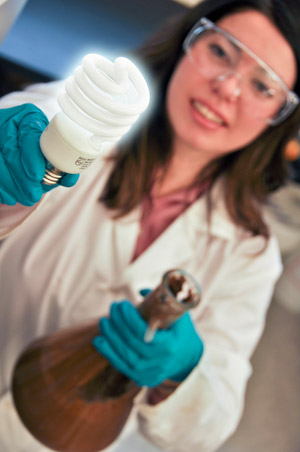
Engineering professor Cigdem Eskicioglu and her team are exploring new techniques for converting biosolids into energy, while a mechanical engineering research team led by Lukas Bichler is developing novel new materials for CANDU nuclear reactors. Both projects were selected this week for Strategic Project Grants from the Natural Sciences and Engineering Research Council.
Two major research projects at UBC’s Okanagan campus have received funding from the Natural Sciences and Engineering Research Council of Canada’s (NSERC) Strategic Project Grants Program.
One of the projects will help develop novel materials for the next generation of Canada’s CANDU nuclear reactors, and the other is aimed at developing sustainable solutions for converting waste into energy.
Strategic Project Grants (SPGs) support early-stage research in areas that could strongly influence Canada’s economy, society or environment in the next 10 years.
“The recent success in the NSERC competition shows the high calibre of the research being conducted in our school,” says Spiro Yannacopoulos, Director of the School of Engineering. “The typical success rate for these competitions is around 20 per cent. These two SPG awards and three previous SPG awards that our faculty have garnered put our faculty in the top 20 per cent in the country.”
The two Strategic Project Grants for UBC’s Okanagan campus are:
- $344,972 for a study of the mechanical behaviour of zirconia-based ceramics for use in CANDU Super Critical Water (SCW) nuclear reactors. This project is led by Lukas Bichler with Spiro Yannacopoulos, and is a partnership with Atomic Energy of Canada Ltd. (AECL), CANMET, the Canadian Neutron Beam Centre – National Research Council of Canada, and international universities (University of Michigan and University of Seville, Spain).
“This project is to develop new materials for use in the structures of nuclear reactors,” notes Yannacopoulos. “This fits within the mandate of the School of Engineering to use innovative engineering skills to solve complex global problems.”
In SCW reactors, water at very high pressures and temperatures is used as a coolant, says Bichler. “At these conditions, the coolant becomes very corrosive and accelerates material failure,” he explains. “As a result, new materials must be developed to safely and effectively contain the coolant.”
- $454,540 for an assessment of biosolids-to-energy options for the Okanagan Valley. This project is led by Cigdem Eskicioglu with co-investigators Victor Lo, Thomas Johnson and Abbas Milani, and is a partnership with the B.C. Ministry of Environment, City of Kelowna, and Paradigm Environmental Technologies Inc.
Eskicioglu says the research project will develop a novel life cycle assessment based decision-making model. Municipalities can use the model to compare — and select — municipal biosolids disposal systems that minimize environmental emissions while maximizing energy (methane) recovery with reasonable costs.
“The community of Kelowna was chosen to serve as a test model,” says Eskicioglu, “however, the proposed approach will be general and applicable to other similar biosolids management optimization cases across Canada.”
Yannacopoulos notes that this project addresses two areas of importance for the School of Engineering: developing sustainable solutions for waste and wastewater, and the development of alternative energy sources.
“By helping the City of Kelowna to convert waste biomass to energy, the need for energy sources and the disposal of a waste product can be combined,” he points out.
Other projects selected by NSERC in the 2010 competition range from biomedical technologies, such as the non-invasive detection of osteoporosis, to the development of digital signalling of fibre-optic communications.
“Supporting science and research is critical to Canada’s future economic growth,” said Gary Goodyear, Minister of State (Science and Technology), in making the announcement Thursday. “This investment will bring together 100 teams of some of the world’s top researchers to work with industry on promising new projects that will help strengthen our economy, create jobs and bring other benefits for communities.”
— 30 —